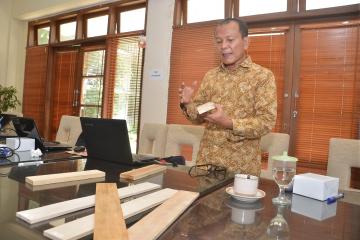IPB Professor: Converted Timber of Inferior Quality to Have Competitive Advantage Products

Timber production in natural tropical forests is set to decline. To respond the pain experiences by Indonesian timber industry in getting enough raw materials for industrial processes, one of the Professor Chair Holders of Faculty of Forestry of IPB (Bogor Agricultural University), Prof. Dr. Imam Wahyudi, had implemented some research programs, one of which is on "Kayu Tanaman Hutan: Karakteristik dan Prospek Pemanfaatannya Berbasis Teknologi Peningkatan Mutu Ramah Lingkungan (Woods of Forest Plants: Characteristics and its Utilization Prospects with Technology-based to Improve the Environmentally Friendly Quality)". It was stated by Prof. Imam, in the press conference in Baranangsiang Campus, Bogor, on 17 March 2016, who had presented his scientific oration on Saturday, 19 March 2016, at the Campus IPB Bogor.
According to him, timber plantations produce lower quality timbers. Field surveys revealed that timber from plantation forests do not dry rapidly and they hollow or split trees. Products made from plantation wood often less robust than desired, less stable and relatively vulnerable to insects, termites and vulnerable to moist, such as wood powder.
"Wooden furniture of teak products have been the mainstay of Indonesia's exports has also similar experienced," he said.
Many factors affect the success of timber planting programmes for good quality timbers including site, seed supply, the process of tree growth, genetic factors, environmental factors and the level of maturity of its constituent cells. Therefore, plantation establishment must be preceded by the use of high quality seed and the application of silvicultural treatments.
According to him, silvicultural measures such as to accelerated growth of the main stem of the plant, should be able to reduce the finite element and growth stress of plantation trees. In addition, silviculture action should also be able to prevent an increase in the portion of juvenile wood and wood as well as able to suppress the reaction of splitting excessive end. The establishment of cooperation between the relevant parties and forest plantations is really required as they are the reliable source of woods into the distant future.
Currently his research team is working with one of the SMEs in Jepara to produce prototype products using high-quality wooden furniture, especially teak wood forests, Albizia, and compacted Jabon.
"This is to convince the related parties that timber of inferior quality for solid wood products can be improved its quality into the reliable raw materials," he said. (Wied)


